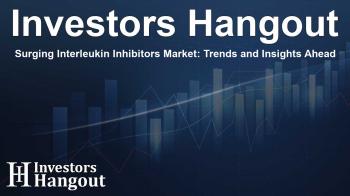Surging Interleukin Inhibitors Market: Trends and Insights Ahead

Exploring the Growth of the Interleukin Inhibitors Market
The interleukin inhibitors market is on the brink of exponential growth, projected to surge from USD 36.78 billion in 2025 to an astonishing USD 85.51 billion by 2032. This rise reflects a compound annual growth rate (CAGR) of 12.8%, driven by an increasing awareness and application of these therapies for managing autoimmune and inflammatory conditions.
Key Market Drivers Influencing Growth
One of the primary factors behind this scaling demand is the significant rise in autoimmune diseases globally. These illnesses, such as rheumatoid arthritis and multiple sclerosis, affect a considerable segment of the population, creating a pressing need for effective treatment options. According to various health sources, autoimmune diseases now afflict approximately 5% to 10% of individuals in developed nations, underscoring the urgent necessity for advanced medical interventions.
Understanding Interleukin Inhibitors
Interleukin inhibitors are designed to selectively block specific interleukins that play pivotal roles in inflammatory responses. By intervening in these complex pathways, these agents help alleviate symptoms in chronic conditions, enhancing patients' quality of life. Their targeted approach allows healthcare providers to offer tailored therapies that minimize side effects while maximizing efficacy, which resonates well with the growing trend towards precision medicine.
Market Segmentation and Revenue Insights
The interleukin inhibitors market can be segmented based on drug type, route of administration, and therapeutic application. For instance, it is anticipated that IL-1 inhibitors will contribute a substantial portion of the market's revenue in the coming years. Furthermore, the oral administration route is expected to gain popularity, attributing to its ease of use and patient preference.
Challenges in the Industry
While the market outlook appears bright, challenges remain. The high costs associated with biologic therapies such as interleukin inhibitors pose a barrier to accessibility, particularly in low- and middle-income regions. Many patients are choosing alternative therapies, including TNF inhibitors and JAK inhibitors, which could hinder the expansion of this market.
Emerging Trends and Future Opportunities
As healthcare continues to evolve, so do treatment methodologies. The shift towards personalized medicine is becoming more pronounced, with pharmaceutical companies innovating to develop interleukin inhibitors that cater to individual genetic profiles. This not only enhances treatment outcomes but also addresses the demand for more targeted therapies.
The Role of Technology in Advancements
Artificial intelligence is revolutionizing the interleukin inhibitors landscape by optimizing drug development and clinical trial processes. Innovations are making it possible to predict optimal dosages and increase the accuracy of efficacy predictions, offering a gateway to next-generation therapeutic options that boast improved safety profiles and broader applications.
Market Insights and Competitive Landscape
The competitive environment within the interleukin inhibitors market also plays a crucial role. Key players include well-established pharmaceutical giants that are continuously striving to innovate. In March, a significant FDA approval for Johnson & Johnson's TREMFYA marked a vital milestone, showcasing the industry's commitment to expanding therapeutic options for patients.
Growing Investment in Research and Development
In pursuit of market dominance, companies are investing heavily in research and development. Innovative approaches, such as the introduction of biosimilars, are expected to increase accessibility and create competitive pricing dynamics in the market. As patents for existing therapies expire, the influx of biosimilars will likely enhance the landscape of treatment choices available to patients.
Frequently Asked Questions
What are interleukin inhibitors?
Interleukin inhibitors are drugs designed to block specific interleukins responsible for inflammatory responses, helping manage autoimmune and inflammatory diseases.
How is the interleukin inhibitors market expected to perform in the coming years?
The market is projected to grow significantly, from USD 36.78 billion in 2025 to USD 85.51 billion by 2032, at a CAGR of 12.8% due to increasing autoimmune diseases.
What challenges does the interleukin inhibitors market face?
High treatment costs and the adoption of alternative therapies can restrict market growth, especially in low- and middle-income countries.
How is technology influencing the interleukin inhibitors market?
Advancements in AI are streamlining drug development and optimizing treatment protocols, improving outcomes for patients using interleukin inhibitors.
What is the significance of personalized medicine in this market?
Personalized medicine enhances treatment efficacy by tailoring therapies based on individual genetic profiles, thus addressing patients' specific needs.
About The Author
Contact Caleb Price privately here. Or send an email with ATTN: Caleb Price as the subject to contact@investorshangout.com.
About Investors Hangout
Investors Hangout is a leading online stock forum for financial discussion and learning, offering a wide range of free tools and resources. It draws in traders of all levels, who exchange market knowledge, investigate trading tactics, and keep an eye on industry developments in real time. Featuring financial articles, stock message boards, quotes, charts, company profiles, and live news updates. Through cooperative learning and a wealth of informational resources, it helps users from novices creating their first portfolios to experts honing their techniques. Join Investors Hangout today: https://investorshangout.com/
The content of this article is based on factual, publicly available information and does not represent legal, financial, or investment advice. Investors Hangout does not offer financial advice, and the author is not a licensed financial advisor. Consult a qualified advisor before making any financial or investment decisions based on this article. This article should not be considered advice to purchase, sell, or hold any securities or other investments. If any of the material provided here is inaccurate, please contact us for corrections.

